
The Egyptian Armed Forces are the military forces of the Arab Republic of Egypt. They consist of the Egyptian Army, Egyptian Navy, Egyptian Air Force and Egyptian Air Defense Forces.

The Kuwait Military Forces are the military forces of the State of Kuwait. They consist of the Kuwait Air Force, the Kuwait Army, the Kuwait Navy & the Kuwait National Guard. The governing bodies are the Kuwait Ministry of Defense, the Kuwait Ministry of Interior, and the Kuwait Fire Service Directorate. The Emir of Kuwait is the commander-in-chief of all defense forces while the Crown Prince is the deputy commander.
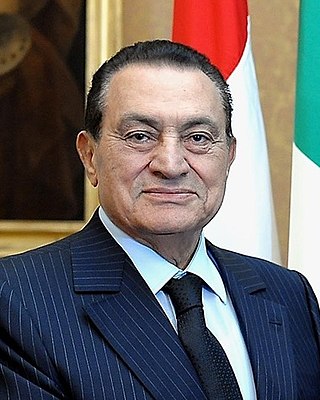
Muhammad Hosni El Sayed Mubarak was an Egyptian politician and military officer who served as the fourth president of Egypt from 1981 to 2011.

Mohamed Hussein Tantawi Soliman was an Egyptian field marshal and politician. He was the commander-in-chief of the Egyptian Armed Forces and, as chairman of the Supreme Council of the Armed Forces, was the de facto head of state from the ousting of President Hosni Mubarak on 11 February 2011 until the inauguration of Mohamed Morsi as president of Egypt on 30 June 2012.

Saad el-Din Mohamed el-Husseiny el-Shazly was an Egyptian military commander. He was Egypt's chief of staff during the October War. Following his public criticism of the Camp David Accords, he resigned from his post as Ambassador to Britain and Portugal and went to Algeria as a political refugee.
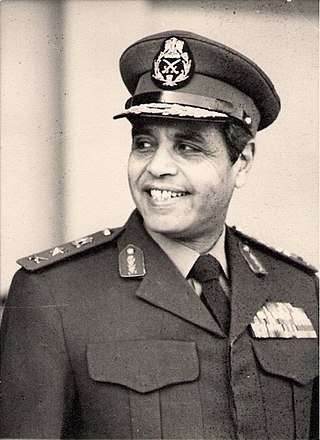
Mohammed Aly Fahmy was an Egyptian field marshal, known as the "Father of the Egyptian Air Defense".

Ahmed Mohamed Shafik Zaki is an Egyptian politician and former presidential candidate. He was a senior commander in the Egyptian Air Force and later served as Prime Minister of Egypt from 29 January 2011 to 3 March 2011 under Hosni Mubarak.
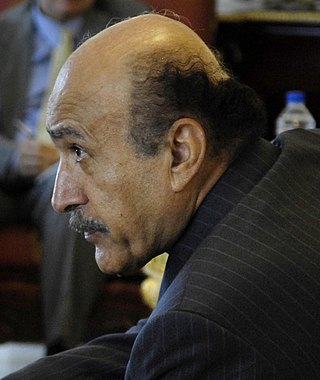
Omar Mahmoud Suleiman was an Egyptian army general, politician, diplomat, and intelligence officer. A leading figure in Egypt's intelligence system beginning in 1986, Suleiman was appointed to the long-vacant vice presidency by President Hosni Mubarak on 29 January 2011. On 11 February 2011, Suleiman announced Mubarak's resignation and ceased being vice president; governing power was transferred to the Armed Forces Supreme Council, of which Suleiman was not a member. A new head of intelligence services was appointed by the ruling Supreme Council. Suleiman withdrew from the political scene and did not appear in public after announcing Mubarak's resignation.
Reda Mahmoud Hafez Mohamed was the commander of the Egyptian Air Force. Mohamed was also the minister for military production in the interim cabinet led by Prime Minister Hazem Al Beblawi.
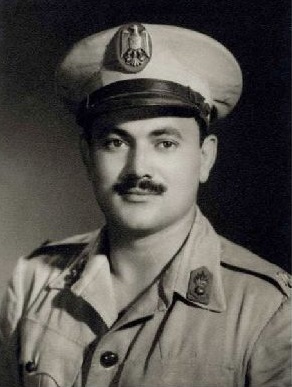
Kamal El-Din Hussein was a member of the Egyptian Free Officers who overthrew King Farouk.

The 2011 Egyptian revolution, also known as the 25 January Revolution, began on 25 January 2011 and spread across Egypt. The date was set by various youth groups to coincide with the annual Egyptian "Police holiday" as a statement against increasing police brutality during the last few years of Hosni Mubarak's presidency. It consisted of demonstrations, marches, occupations of plazas, non-violent civil resistance, acts of civil disobedience and strikes. Millions of protesters from a range of socio-economic and religious backgrounds demanded the overthrow of Egyptian President Hosni Mubarak. Violent clashes between security forces and protesters resulted in at least 846 people killed and over 6,000 injured. Protesters retaliated by burning over 90 police stations across the country.

Lieutenant General Sami Hafez Anan or Enan is an Egyptian military officer. He was the Chief of the General Staff of the Armed Forces from 2005 until August 2012, until his retirement was announced by President Mohamed Morsi. In January 2018, he announced himself as a candidate in the 2018 Egyptian presidential election before being arrested for violating the military rules for announcing his candidacy without seeking the Supreme Council of the Armed Forces approval, which "constituted clear incitement against the armed forces with the intention of driving a wedge between it and the great Egyptian people." He was also accused of forging documents to falsely indicate his military service was terminated. He was released on 22 December 2019.
Mourad Mouwafi or Muwafi is an Egyptian politician and major-general. Mouwafi was also the governor of Northern Sinai during a 2011 uprising in the region. He was appointed the Director of the Egyptian Intelligence shortly before the end of the Mubarak regime. He was dismissed by former President Mohamed Morsi from the position on 8 August 2012.

The Supreme Council of the Armed Forces is a statutory body of between 20 and 25 senior Egyptian military officers and is headed by Field Marshal Abdul Fatah al-Sisi and Lieutenant General Mohamed Ahmed Zaki. The council is convened only in cases of war or great internal emergencies. As a consequence of the Egyptian Revolution of 2011, SCAF assumed power to govern Egypt from departing President Hosni Mubarak on 11 February 2011, and relinquished power on 30 June 2012 upon the start of Mohamed Morsi's term as president. The Council has met regularly in times of national emergencies. During the course of the 2011 revolution, the Supreme Council of the Armed Forces met first on 9 February 2011 under the chairmanship of Egyptian president, Hosni Mubarak. The Council met for the first time without the chairmanship of the president on the following day, 10 February, and issued their first press statement which signaled that the council was about to assume power which they did the following day after Mubarak's resignation. The military junta was headed by Field Marshal Mohamed Hussein Tantawi who served as the Minister of Defense under Mubarak, and included the service heads and other senior commanders of the Egyptian Armed Forces, namely Lt. Gen. Sami Hafez Anan, Armed Forces Chief of Staff; Air Marshal Reda Mahmoud Hafez Mohamed, Air Force commander; Lt. Gen. Abd El Aziz Seif-Eldeen, Commander of Air Defense; and Vice Admiral Mohab Mamish, Navy Commander in Chief.

The Egyptian Crisis is a period that started with the Egyptian revolution of 2011 and ended with the installation of a counterrevolutionary regime under the presidency of Abdel Fattah el-Sisi in 2014. It was a tumultuous three years of political and social unrest, characterized by mass protests, a series of popular elections, deadly clashes, and military reinforcement. The events have had a lasting effect on the country's current course, its political system and its society.

Egypt–Syria relations refers to the bilateral relations between the Arab Republic of Egypt and the Syrian Arab Republic. Egypt has an embassy in Damascus. Syria has an embassy in Cairo. Both countries are members of the Arab League.
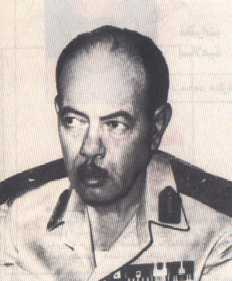
Mohamed Fawzi was an Egyptian general and politician who served as minister of defense.
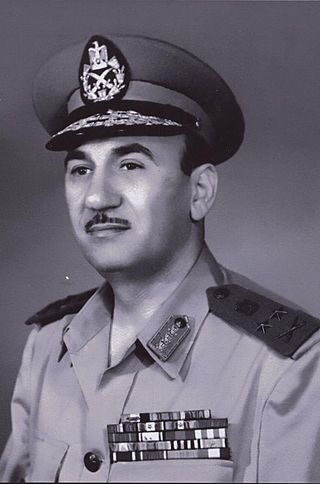
Mohammed Ahmed Sadek was an Egyptian colonel general who served as defense minister under the rule of President Anwar Sadat.

Ibrahim Abdul Ghafour El Orabi ; 20 May 1931– 18 September 2019) was an Egyptian Army Lieutenant General and the 13th and former Chief of Staff of the Egyptian Armed Forces. He was a member of the Free Officers Movement, as defined by the Egyptian revolution of 1952. He served as the 7th Chief of Operations of the Armed Forces, the commander of the Second Field Army, commander of the 21st Armoured Division, Commander of the Arab Forces in Iraq, and as the commander of the Egyptian Armoured Corps, which was deployed in the North Yemen Civil War. As the chief of staff of the Egyptian Armed Forces, Orabi was the second highest-ranking military officer in all of the Egyptian Armed Forces.
Hamdy Wahiba, is a retired lieutenant general of the Egyptian Army. He served as the 17th chief of general staff in the Egyptian Armed Forces from 31 October 2001 to 29 October 2005. He also served as chairperson of the Arab Organization for Industrialization (AOI) from 2005 to 2012. Preceded by Magdy Hatata, Wahiba was previously appointed as commander of the Republican Guard in 1997. He was the sixth commander of the guard under Mubarak.
















